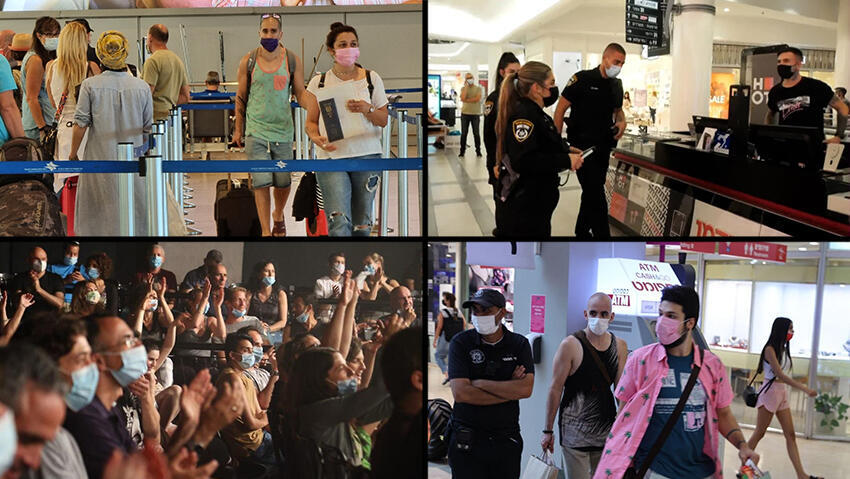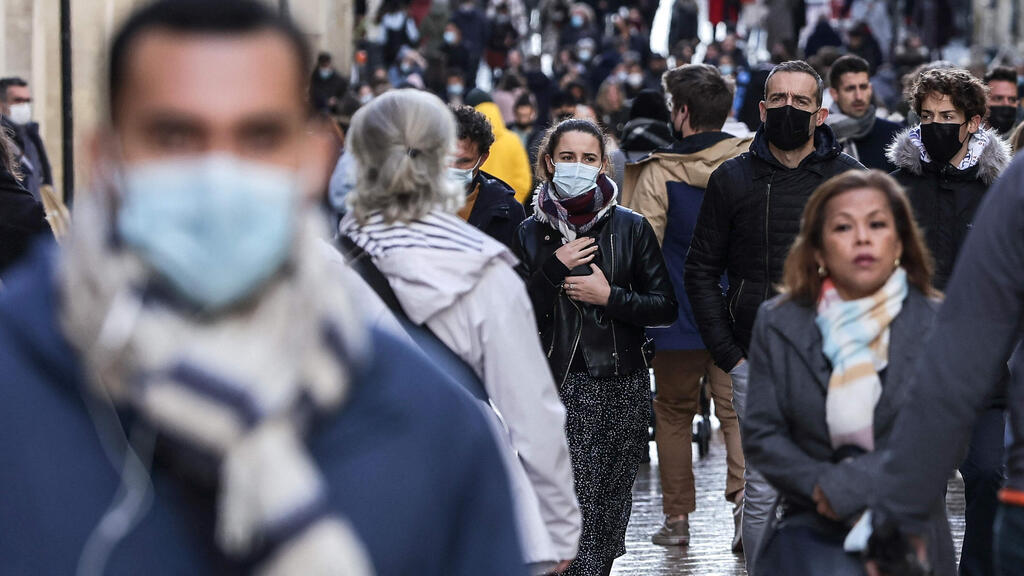Medical experts remain divided on the effectiveness of masks to combat the spread of COVID-19 after Israeli lifted the last health restriction after nearly two years since the onset of the pandemic.
Israel lifted its indoor mask requirement late Saturday, marking the end of rules that were first implemented in April 2020.
3 View gallery


Israelis wear masks in public places
(Photo: Motti Kimchi, Shmulik Dodfor, Shamir Elbaz)
Masks will still be required in certain places, such as in airplanes, hospitals, and elderly care facilities.
Some doctors welcomed the decision and argued that masking should never have been imposed in the first place.
“I think that mask mandates were unnecessary from the beginning because there is not enough scientific evidence that they are truly effective in reducing transmission of the coronavirus or viral respiratory diseases,” Dr. Yoav Yehezkelli, an internal medicine specialist and co-founder of the Israeli epidemic management team, said.
“Up until the start of the pandemic, masks were not recommended in order to reduce the number of cases in viral respiratory diseases,” he added. “There is not enough convincing research that it’s effective.”
Yehezkelli, a lecturer at Tel Aviv University who specializes in emergency and disaster management, said that the Health Ministry made a mistake by instituting a masking requirement. The primary goal, he believes, was to “instill fear of the virus in the public.”
“I think that the pandemic ended a while ago,” he related. “We’re talking about a respiratory virus that resembles other respiratory viruses. It comes in waves, which is natural.”
Nevertheless, those who have symptoms of the virus should continue to mask to avoid infecting others.
“It’s important to note that [standard surgical] masks do not protect the wearer; they are intended to protect others,” Yehezkelli said.
Likewise, Prof. Amnon Lahad, chairman of the department of family medicine and vice dean of community health at the Hebrew University of Jerusalem, said that putting an end to masking is a step in the right direction.
“I’m happy that people are starting to understand that we need to live with a certain level of COVID cases,” Lahad said. “The government doesn’t need to be involved in [masking] at this point. Wearing a mask is now a personal choice; those who are high-risk and in crowded places [should wear them].”
Lahad emphasized that he himself would continue masking in indoor places.
Nevertheless, he agreed with Yehezkelli that “there is very little quality research” on the effectiveness of masks in preventing infection. Still, he believes the mandates were necessary early in the pandemic when little was known about the virus and its health effects.
“After we got the vaccines, which protect against serious disease, I think it was already possible to cancel the masking rules,” Lahad added.
Israel’s lifting of its years-long mask rules comes as morbidity rates continue to decline across the country, and on the heels of a similar decision in the United States, where a judge struck down federal masking rules on public transportation.
Although it appears as though the face coverings are on their way out, some medical experts still believe that they significantly reduce virus transmission.
Prof. Nadav Davidovitch, director of the School of Public Health at Ben-Gurion University and a chair of the Health Policy Program at the Taub Center, said that “masks played and continue to play a very important role.”
“There is no law that we need to wash our hands after using the bathroom, but that doesn’t mean we shouldn’t do so,” Davidovitch said. “Overall, I think it’s the right decision [to end the mandate] but we have to understand that this doesn’t mean that COVID-19 has disappeared. People need to continue to get vaccinated and use masks in a smart way.”
People at higher risk of developing serious illness – such as those who are immunocompromised or the elderly – should continue to wear face coverings, he said. He also recommended that everyone continue to mask in crowded places, like buses.
“If cases begin to rise again, it’s possible that we’ll have to return to masking,” Davidovitch warned. “We also can’t forget that the whole issue of long COVID and the disease’s long-term effects are still being felt, and we need to deal with them.”
The article was written by Maya Margit and reprinted with permission from The Media Line



